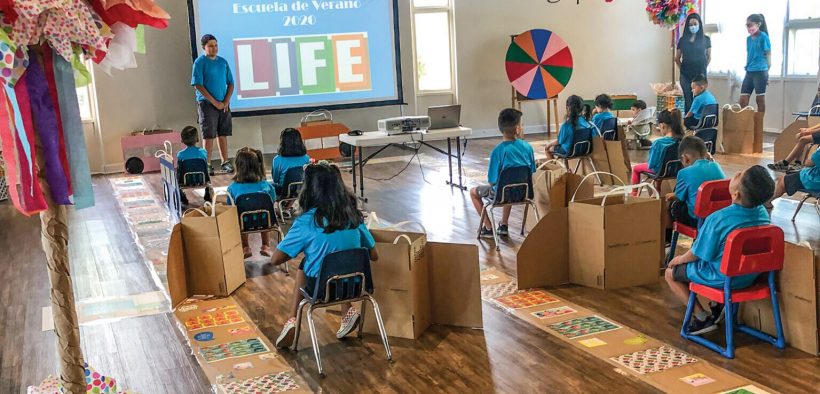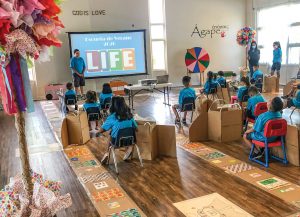The Pandemic Is Pushing Children’s Ministers To Be Even More Creative

Leave it to a children’s minister to explain the apostle Paul’s spiritual transformation by making a video about the conversion of eggs, flour, sugar, and chocolate into brownies.
And don’t be surprised when that minister delivers the transformed treats to all the kids of the congregation. At their homes. In a pandemic. 
That’s what Penny White did. That and a lot more.
White serves as children’s minister for the 250-member Conejo Valley Church of Christ in Thousand Oaks, Calif., about 40 miles northwest of Los Angeles.
The pandemic has upended and reinvented the form and shape of ministry as Churches of Christ have learned to be virtual, socially distant, and masked. But perhaps no aspect of congregational life has been called to creativity more urgently than children’s ministry.
White calls it “learning as you’re running.”
Before COVID-19, she had never edited video.
Now she produces a 25- to 30-minute segment each week with elements similar to an in-person children’s worship—songs, prayers, and a story.
Access to MinistryWatch content is free. However, we hope you will support our work with your prayers and financial gifts. To make a donation, click here.
Occasionally, she enlists her husband, Jim, and son Jonathan, a student at Pepperdine University, to dress up as David and Goliath. Or David and Samuel. Or Peter and Andrew. Or …
Even in normal times—remember those?—ministers are always preparing for next Sunday. But now, she said, it has to be filmed on Wednesday and edited on Thursday so staff who do the main worship video can get it on YouTube.
“It’s been the most stressful time ever in ministry,” said White, who’s served the Conejo Valley church since 1999. “I’ve worked more hours and at a pace that is very different.”
Add to the stress the opinions shared by, well, everyone, about how to do things, what to do, what not to do, when to do it, and when not to. It’s a lot.
‘QBS’ replaces VBS
On the opposite side of the country, youth minister Luke Reynolds marshaled a team from the Central Church of Christ in Winter Haven, Fla., to help bring Dak and Zak to life.
The puppet characters, created by Reynolds, were the stars of “QBS”—Quarantine Bible School.
Reynolds devised the concept in lieu of a Vacation Bible School when VBS wasn’t possible. The 15-minute videos featured a Bible story, a puppet skit, crafts, and songs.
“It just took off, and by the time things began opening back up, the elders wanted us to continue. The kids have absolutely loved it,” said Reynolds, who was surprised by the project’s popularity. “I thought kids would kind of watch it while playing or whatever.”
But kids watch the same episodes over and over, Reynolds said, and two Christian schools in the community 50 miles east of Tampa play “The Dak and Zak Show” during chapel.
Connection over content
Not every children’s minister can write and produce a video series. And Marian Parker, who serves the Campbell Church of Christ, 50 miles south of San Francisco, thinks that’s OK.
Parker readily acknowledges the pandemic “completely forced me into reinventing children’s ministry. Everything I’ve done in the past had to be thrown out when it wasn’t something we felt we could do or wasn’t safe.”
“I’ve realized that what’s most important is connection over content,” Parker said.
While the Campbell congregation, with 500 members and about 70 children, has more resources than some others, she encourages fellow children’s ministers to resist feeling like they have to reinvent the reel.
“There are so many resources out there—it’s just a matter of knowing where to look and in what capacity you can use them,” Parker said.
For example, YouTube is a great source of kids’ worship songs with motions, and many curriculum companies have made free materials available for children.
The harder part—and the more important one, she said—is maintaining relationships with and among the children.
“For some of them, when they do see me or their friends, they don’t remember,” she said, noting how long the pandemic has disrupted their young lives.
“They’re so little—you almost have to lay that groundwork again and form those connections from scratch, which is so incredibly sad. You have to go back further than you expected.”
Taly Barrera doesn’t have an official title at the Elgin Church of Christ, where her husband, Ricardo, is the minister. But she’s passionate about ministry to the children of the Spanish-speaking congregation of about 180 in the northwest Chicago suburb.
The Elgin church has managed to do some things in person, including a Vacation Bible School, by respecting the wishes of some parents who wanted strict precautions in place.
“We all knew which kids needed to be a little more distanced because of parents’ preferences,” Barrera said, “and we all agreed to wear masks the whole time.”
Women of the church prepared meals, and children participated in many traditional VBS activities.
“Thank God our numbers in the area were really low then,” Barrera said, referring to COVID-19 infections. “No one got sick.”
She calls it a leap of faith: “To be honest with you, it could have gone the other way. We prayed and said, ‘We’re going to be extra careful, and if we feel it’s not safe, we’ll make changes.’”
After the VBS success, Barrera prepared live Zoom lessons for a different age group three or four nights a week. Participation fell off over time, so she learned how to download Zoom sessions to YouTube so families could watch at their convenience. She said young families needed flexibility amid all the responsibilities the pandemic has wrought.
Jennifer Schroeder, children’s minister at North Atlanta Church of Christ, a multicultural congregation of about 1,000 members, said pandemic isolation has left kids “clamoring for connections.”
“My own kids are struggling emotionally because they don’t feel any sense of normalcy,” she said. “Where could we find moments of normalcy?”
Determined to find ways for kids to get to see each other, even though the church was still meeting virtually, Schroeder used a big field and undercover parking at the suburban Atlanta church to re-envision some annual children’s activities.
She and her team spray-painted circles for socially distanced games and fellowship activities. And when falling temperatures brought some pushback, she reminded objectors how often they sat outside at football games. The church borrowed some space heaters and moved ahead.
Similarly, the Conejo Valley church reinvented its annual back-to-school backpack blessing as a drive-through event in the parking lot.
“We had goodie bags and encouragement for kids and parents,” White said. “We surrounded each car and prayed for each family.”
Later, a harvest festival was converted to a drive-through Trunk or Treat, and an annual event remembering the birth of Jesus became an outdoor journey through an adjacent field. Children hiked to see shepherds, then Mary, the wise men and Luke telling about God’s gift of Jesus to the world. Each child left with a wrapped gift box.
Ultimately, children’s ministers create new things out of old ideas, doing what they can to minister to children during a difficult time.
“Be yourself,” White said. “That’s what the children need: the person they’re used to being with—that familiar face.”
And brownies. All kids need brownies.
This article was published at Religion UnPlugged. It is reprinted with permission.



